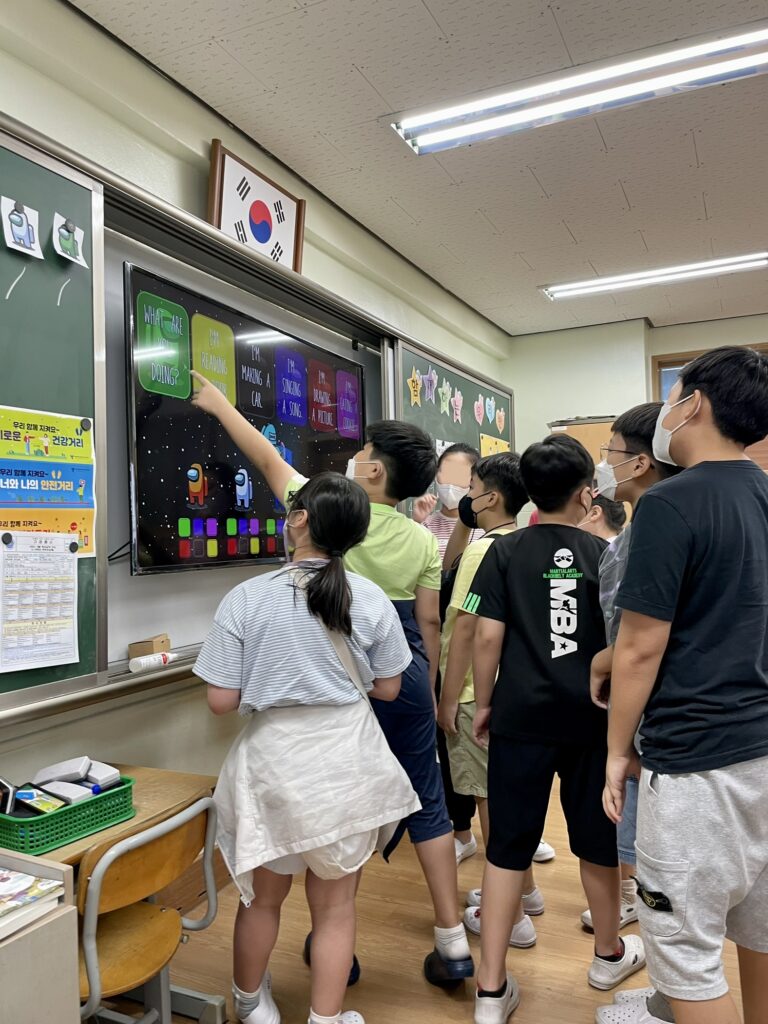
So you’re applying to teach English in Korea with EPIK? EPIK is a fantastic way to work in Korea, with great benefits, job security, provided apartments, and more. If you’ve made it to the interview, congratulations! I know how nerve-wracking the application process can be, especially the interview, so I’m here to help. With these EPIK interview questions, you’ll be well-prepared to not only pass but ace the EPIK interview and be on your way to Korea.
Haven’t made it this far in the process? Check out my blogs on how to become an English teacher in South Korea and the pros and cons of doing EPIK.


EPIK Interview Questions: FAQs
Is the EPIK Program right for me?
When choosing whether to move to Korea as an English teacher or not, there is a lot to consider. You have to consider if Korea is the right country for you, if teaching English is the right job for you, and if so, whether to apply to public schools or private schools. There are many pros to teaching English with EPIK, including job security, benefits, and lots of vacation time. However, there are also cons, including no choice in placement, low security, and lots of what we call “desk-warming”.
I’ve put together my full EPIK Review after 3 years of teaching in the program to help you make an informed decision.
Is the interview online or in person?
All interviews are conducted online on Korean Standard Time (KST), so be ready for an early morning or a late night!
When will my interview be?
If you pass the initial application screening, you’ll be invited to an online interview. For the August intake, EPIK’s timeline says that this will happen between April and July. For the February intake, it will happen between October and January. I applied for the August 2021 intake on February 10th and was invited to an interview on April 26th.
How long is the interview?
The EPIK interview will take about 20 – 30 minutes.
What should I wear?
At the minimum, dress business casual. I wore a blazer with a button-up underneath. Overall, you want to look like you put some effort into your appearance as you would with any other job interview. Show that you care enough about the interview that you took time to get ready for it.
Do I need to prepare a demo lesson?
There is mixed information out there about whether to prepare a demo lesson for your EPIK interview or not. Rumor has it that some interviewees are asked for a 10-15 minute demo lesson. I was not asked for a demo lesson and I don’t personally know anyone else in the program who was, but sometimes it happens. Online forums suggest that if they ask you for a demo lesson, they’ll give you a grade, a topic, and 3-5 minutes to prepare.
I prepared for this scenario and practiced giving a short demo lesson on a few different topics, which I suggest you do too. You can’t be too prepared! But I wouldn’t stress out too much about it. It seems like most people aren’t asked for the demo lesson, and if you are, it’s just to check your basic teaching capabilities.


EPIK Interview Questions
What do you know about EPIK? What do you know about Korea?
These questions are a great time to show that you have done your research. EPIK wants teachers who are dedicated to the job and the program. Some foreign teachers come to Korea solely to live and travel abroad, ignoring their job duties. Others apply on a whim with little idea about EPIK or Korea. Make sure to address this question in a way that shows that you are NOT one of those people. It’s good to show them you know basic facts about the program and the country. At the end of your answer, you can wrap it up by tying these facts into why the program appeals to you. Show them that you are coming to Korea and participating in EPIK because you have a true interest and passion for the program and the country!
Please don’t forget what EPIK stands for, because they might ask you this as an early weed-out question.
Why EPIK?
Like the previous questions, this question is an opportunity to show off your knowledge about EPIK and why it’s a good fit for your personal and career goals. It’s best to keep your answer focused on EPIK specifically instead of talking about why you want to come to Korea. You can move to Korea through multiple routes, so talk about why teaching English, specifically with EPIK, is the right program for you.
How will you handle any conflict or disagreement that may come up with your co-teachers?
The EPIK interview questions will probably involve a lot of “what if…?”, “how will you handle…?”, or “what will you do if…?” scenarios. As you know, you’ll be working closely with Korean co-teachers during your time as an EPIK teacher. It’s likely that at some point, you’ll encounter a co-teacher who does things differently than you. EPIK wants to know that you are prepared to co-teach collaboratively in all situations.
It’s best to respect the Korean co-teacher’s way of doing things, as they have likely been in their position a lot longer than you. Koreans take seniority seriously in their society, so anyone who is older than you or has been at their job longer than you should be respected. You can carefully bring up a conflict/disagreement with them outside of class hours if it isn’t getting resolved or is creating further issues. The important thing to stress here is that you’ll handle things with respect, avoiding conflict or drama as best as possible.
How will you handle a student who isn’t interested in learning English?
If you teach English in Korea, you WILL encounter this situation and the EPIK office knows that. Inevitably, there will be some students who aren’t interested in learning English. The best way to handle this situation is to learn what does interest them, such as music, sports, TV shows, or video games. It’s easy to bring other interests into the English classroom, whether it’s through example pictures and sentences, projects, or game themes. If you can’t get their attention through English alone, you can get it through including their hobbies and passions.
You can also get their interest by learning what motivates them. I have a point system in my classroom and every quarter, they get prizes for their points. These prizes include pencils, notebooks, and candy. I’ve found that my students show more interest when they are working towards getting points/prizes.
How will you handle a mixed-abilities classroom?
You are very likely to have a mixed-abilities classroom because you’ll be teaching at a public school. Some of your students will be in extra English classes outside of school, while some only take English at school. It can be difficult to teach a classroom full of different abilities, so EPIK wants to know that you’re prepared for this situation.
One way to handle this is to arrange the seating chart so high-level and low-level students sit next to each other. You can also arrange teams for games and projects with an equal number of high-level and low-level students. The students helping each other is highly valuable. You can also create two different versions of the same assignment to allow students to work as close to their level as possible.
How will you handle classroom management?
Classroom management is an important part of being a teacher. From your first day on the job, you should set up classroom rules that will benefit everyone’s learning. These can include only speaking English, not talking while others are talking, paying attention, and being respectful to other classmates. Whatever rules you think will create a productive learning environment, talk about them here.
What is your teaching philosophy?
This sounds like a difficult question to answer, but EPIK just wants to know what is important to you in your classroom. For example, what do you value the most: creativity, open discussion, introducing new perspectives, having fun, or something else? I recommend searching teaching philosophies and choosing one that stands out to you. Then talk about how you will bring that philosophy into the English classroom.
How will you handle homesickness and cultural differences?
EPIK wants to make sure that teachers won’t abandon their contracts early. It’s harmful to schools and students when English teachers break their contract early. It leaves the school without a native English teacher until at least the next intake. Unfortunately, this does happen when people aren’t prepared for cultural differences and homesickness.
You should present a convincing case as to how you will handle living abroad and all of the difficulties that come along with it. You can back this up by talking about previous experiences abroad, whether from traveling, studying abroad, or living abroad. Tell them about a time that you suffered from homesickness or experienced cultural differences and how you were able to overcome it. You can talk about calling family and friends back home, cooking comfort food, watching comfort shows and movies, or finding a “home away from home” by making friends here in Korea.
Do you have previous experience abroad?
EPIK wants teachers who are going to be able to handle culture shock. This doesn’t mean that you have to have traveled abroad before! If you have no experience abroad, that’s okay. This is your chance to tell them that you’ve done your research and you know what you’re getting yourself into. Acknowledge that you might struggle with culture shock, but you have a plan for how you’re going to deal with it.
If you have traveled or lived abroad before, this is a great time to use those experiences to show them that you are prepared for whatever culture shock may come your way.
How does this job relate to your future goals?
If your career goals are in education, this should be an easy question to answer. However, the majority of English teachers in Korea don’t continue to work in education after they leave. If this is the case for you, you should talk about the transferrable skills that teaching will provide that benefit your future job goals. Being a teacher is a highly respected job that can provide a valuable skillset for almost any other career path. Make sure to talk about how teaching in the short term will set you up for success in the long term, even if you aren’t continuing in education.

If you practice answering these EPIK interview questions, you will go into the interview prepared, confident, and set up for success. I recommend thinking through answers on your own and then having friends or family do a few mock interviews. I wish you the best of luck on your journey to teach English in Korea!
EPIK is a great program, but I don’t recommend it for everyone. If you want to learn more about my thoughts on EPIK after 3 years, check out my EPIK program review.




Leave a Reply